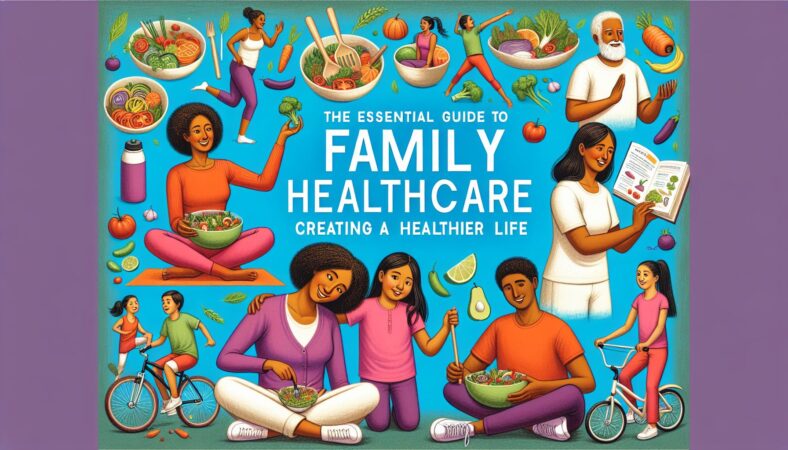As families, our highest priority is the well-being of our loved ones. In the pursuit of a fulfilling life, it is crucial that we prioritize our health. Family healthcare plays a significant role in maintaining and improving our overall well-being. By adopting the right practices and being proactive in preventing illnesses, we can pave the way to a healthier life for ourselves and our families. In this comprehensive guide, we will explore the importance of family healthcare and focus particularly on cancer prevention, fostering a better understanding of how to live a healthier life.
The Fight Against Cancer: A Blueprint for Prevention
Cancer, a formidable foe, has shaken families worldwide for decades. It can bring immense suffering and, often, irreversible loss. However, it’s important to remember that prevention is within our reach. By adopting certain lifestyle changes and seeking early detection, we can significantly reduce the risk of developing cancer within our families.
Dietary Choices: Nurturing Our Bodies
One of the most effective ways to prevent cancer is through a healthy diet. Opting for a diet rich in fruits, vegetables, whole grains, and lean proteins bestows our bodies with essential nutrients and antioxidants. These nutrients help in shielding our cells against damage and reducing the risk of cancer development. Moreover, avoiding highly processed foods and limiting the consumption of red and processed meats can further lower the risk.
Daily Exercise: Uplifting Our Bodies and Minds
Incorporating physical activity into our daily routine goes beyond just maintaining a healthy weight. Regular exercise boosts our immune system, improves circulation, and lowers the risk of various types of cancer. Engaging in at least 150 minutes of moderate aerobic activity or 75 minutes of vigorous aerobic activity weekly can be an excellent starting point for keeping cancer at bay.
Tobacco and Alcohol: Cutting the Cords
Tobacco and alcohol use are two significant risk factors for many types of cancer. By quitting smoking and avoiding secondhand smoke, we can dramatically reduce the risk of lung, mouth, throat, and other related cancers. Similarly, excessive alcohol consumption can lead to liver and other forms of cancer. Moderation or, ideally, abstinence from alcohol is the prudent path to a healthier life.
Sun Protection: Shielding Our Skin
While we all love basking in the warm embrace of the sun, overexposure to harmful ultraviolet (UV) rays can cause skin cancer. Encouraging our families to use sunscreen with a minimum sun protection factor (SPF) of 30, seeking shade during the peak hours of sunlight, and wearing protective clothing such as hats and sunglasses can protect us from the harmful effects of the sun.
Routine Check-ups: Early Detection, Lifesaving Interventions
Detecting cancer at its earliest stages improves the chances of successful treatment. Encourage family members to undergo regular health check-ups, including screening tests and examinations. Colonoscopies, mammograms, Pap smears, and skin checks are just a few examples of how we can proactively detect cancer before it progresses. Early intervention can make all the difference.
Family Healthcare: The Foundation of a Healthier Life
While cancer prevention is vital, family healthcare encompasses much more, laying the foundation for a healthier and happier life.
Mental Health: Nurturing Our Emotional Well-being
Maintaining our mental health is as crucial as caring for our physical well-being. Encourage open communication within the family, especially during challenging times. Expressing emotions, providing support, and seeking professional help when needed can help alleviate mental health issues.
Healthy Sleep Habits: Rejuvenation for Mind and Body
Adequate sleep is essential for overall health, as it allows our bodies to repair and recharge. Ensure that every family member, regardless of age, establishes a consistent sleep routine. Aim for seven to nine hours of quality sleep per night to support physical and mental well-being.
Vaccinations: Shielding Against Preventable Diseases
Immunizations are a crucial part of family healthcare. Vaccinations safeguard our loved ones against numerous infectious diseases, reducing the risk of serious complications or long-term health problems. Consult with your healthcare provider to ensure everyone receives the recommended vaccinations based on their age and unique health considerations.
Conclusion: Empowering Our Families for a Brighter Future
Now armed with a better understanding of family healthcare and cancer prevention, it’s time to take action. By adopting a healthy lifestyle, making wise dietary choices, prioritizing our mental health, and seeking preventative care, we pave the way for a healthier, happier future for ourselves and our families.
Together, we have the power to build a strong defense against cancer while fostering a thriving environment for our family’s overall well-being. Take charge today, and let us shape a brighter tomorrow.
